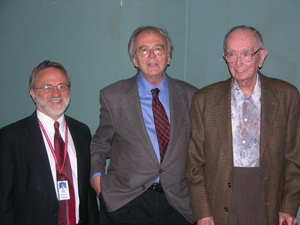 |
(From left to right) Samuel M. Cohen, M.D., Ph.D., chairman of UNMC’s Department of Pathology and Microbiology joins Alexander Tomasz, Ph.D., professor at Rockefeller University, and legendary UNMC physician, Harry McFadden, Jr., M.D., after the McFadden Lectureship on Oct. 20. Dr. Tomasz spoke at the lectureship, which is named for Dr. McFadden. |
Alexander Tomasz, M.D., professor and head of the microbiology laboratory at Rockefeller University in New York, spoke about how bacteria develop resistance to the antibiotic, vancomycin, a drug that had been used to effectively treat staph infections.
Resistance to this drug is one of the latest in a long-line of changes the bacteria have undergone since doctors began treating it with antibiotics in the first half of the 20th century.
“Unfortunately these bacteria have an incredible number of tricks to avoid this and other antibiotics,” Dr. Tomasz said. “Eventually the bacteria are going to win.”
Staph demonstrated two different strategies in becoming resistant to vancomycin, Dr. Tomasz said.
To kill staph, vancomycin attacks certain vital parts of the bacteria that are important for them to grow and divide.
In one strategy, the resistant bacteria have simply created more of the vital parts to counteract the presence of the antibiotic.
In another strategy, the vital parts of the cell actually undergo fundamental changes that make them fully resistant to vancomycin, Dr. Tomasz said.
During his lecture, Dr. Tomasz showed how he was able to track a strain of staph bacteria as it became resistant to vancomycin.
Seeing the bacteria take steps toward resistance was the highlight of the lecture, said Ken Bayles, Ph.D., who is part of a team of UNMC researchers who study staph.
“Usually we just see the bacteria before it’s resistant and then what it looks like after it becomes resistant,” Dr. Bayles said. “Dr. Tomasz was able to show us what the little steps are as the bacteria evolve toward antibiotic resistance.”
Dr. Tomasz was the 12th person to present the McFadden Lectureship, which was sponsored this year by UNMC’s Department of Pathology and Microbiology and alumni College of Medicine’s class of 1964.
The lecture is named after Harry W. McFadden, Jr., M.D., a legendary UNMC doctor who was chairman of the school’s former Department of Medical Microbiology from 1956 to 1985. Dr. McFadden also served twice as UNMC’s interim chancellor.